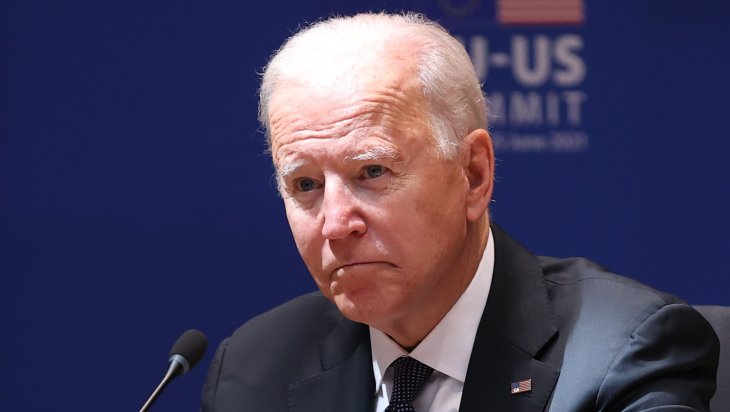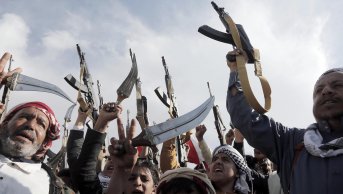Biden Administration’s Saudi Dilemma

For a while, institutional and societal ties between Saudi Arabia and the United States have been strained. Although the U.S. heralds that it will withdraw most of its troops from the Middle East, the military, political and institutional presence of the U.S. in the region, notably since 9/11, has rendered it nearly impossible for the countries of the region to visualize a foreign policy course without bearing in mind the U.S. foreign policy prioritizations and implications.
With the election of the Biden administration, relations, priorities and opportunities have been reshaped across the Middle East, including in Iraq, Iran, Yemen, Israel, Saudi Arabia and the United Arab Emirates (UAE). While fundamental steps have been taken in relations with certain countries in the region, the Biden administration’s call for diplomacy and advocacy of democratic values were reflected in the Middle East as part of the presidential political rhetoric.
Altered policy priorities
In view of developments related to Joe Biden's presidency in the U.S., Saudi Arabia became one of the few countries in the region that has dramatically altered its foreign policy. Saudi Arabia’s approach to easing ties with regional competitors Turkey, Qatar and Iran, as well as resolving regional crises such as the Gulf intervention against Qatar, indicated a shift in Saudi foreign policy from harsh interventionism to forced appeasement. The situation, however, is still critical in Saudi Arabia’s ties with the U.S., which it has considered to be its most significant foreign policy partner for a long time.
For some time, the Biden administration’s foreign policy goals regarding the Middle East, and even the inability to recognize the Middle East as a foreign policy priority, have been troublesome developments for Saudi Arabia. There have been difficult moments in institutional, social and judicial interactions taking place within the U.S.-Saudi ties, and these moments have embodied the problematic nature of this relationship.
From an institutional standpoint, it is evident that members of U.S. institutions, regardless of their political affiliations, are reacting against Saudi Crown Prince Mohammed bin Salman (MBS), whether they are Democrats or Republicans. During U.S. President Donald Trump's tenure, many bills were introduced in both the Senate and the House of Representatives calling for the U.S. to cease providing logistical and intelligence support to Saudi Arabia in the war in Yemen.
When Biden proclaimed that ending the war in Yemen would be a priority for his administration, that conflict, which had not been a major concern outside of this context throughout the Trump presidency, took on a wholly different meaning. This U.S. stance was not only unveiled at a time when the Houthis maintained their regional and national deterrence but also at a time they had strategically and militarily caught Saudi Arabia off guard. But the war in Yemen only represented a part of the deteriorating relations. The murder and dismemberment of journalist Jamal Khashoggi was another chilling event that brought about intense pressure on MBS.
U.S. guarantee in jeopardy
The phone call between U.S. Secretary of Defense Lloyd Austin and MBS in early June also harmed the U.S.-Saudi security partnership. The U.S. even immediately alerted the Saudi side that several military assets would indeed be evacuated from Saudi Arabia and the preparations for this had already commenced.
Certain speculations regarding the military assets pulled from Saudi Arabia might well be leveraged in the strategy of restraining China’s ascent and military footprint, which is key to Biden’s foreign policy, have put Saudi Arabia in a precarious situation. The relevance attached by the Biden administration on the Quadrilateral Security Dialogue (QUAD) – a group consisting of the U.S., Japan, Australia and India – and the veracity of the assertions about the role of Asian powers may have curbed Saudi indispensability in the eyes of the U.S. Among others, the Houthis’ intermittent ballistic missile and drone strikes on Saudi soil, and perhaps even the inauguration of Iran’s hardliner Ebrahim Raisi as president, have fractured Saudi Arabia’s security reservations and confidence in the U.S. Even Saudi authorities began talking to Iranian counterparts recently as a local substitute strategy for ensuring security through diplomacy, with the facilitation and mediation by Iraqi Prime Minister Mustafa al-Kadhimi.
Choosing the lesser evil
The fact that U.S. institutions have hinted that Saudi Arabian authorities are not exceptional of questionability and accountability has created a strategic dilemma again for the Biden administration. The certain implications of the lawsuits registered in the U.S. and Canada by and against former Saudi intelligence officer Saad al-Jabri, also known as Mohammed bin Nayef’s right-hand man, have impacted ties between the two states. Along with the lawsuits, MBS's reputation in the eyes of U.S. institutions and society is becoming ever more toxic by the day. But perhaps more substantially, the Biden administration is trapped between catering to the requirements of the U.S. institutions and non-governmental organizations while still conducting U.S. foreign policy.
Another event that will wreak havoc on bilateral ties is the Biden administration’s possible actions, which will certainly place the government in a tough position. The families of 9/11 victims and those who survived the terrorist attack are asking that the Biden administration ease the prohibition on access to classified documents as the 20th anniversary of 9/11 approaches.
Gatherings with persons affected by the attacks were occasionally held, according to White House Press Secretary Jen Psaki, to lift the prohibition on access to the files. Recently, the Federal Bureau of Investigation (FBI) has also stated that more of the classified documents could be available for public use soon. As per the power play of U.S. institutions, Biden seems to be also in favor of revealing confidential material that is not antithetical to U.S. national security, echoing an Obama-Biden period position. Declassifying the documents was also a campaign promise of Biden.
Even though U.S.-Saudi relations are in the middle of an institutional, judicial and societal crisis, Saudi Arabia has made it plain that this process must go forward quickly. For this purpose, it is stated that Saudi Arabia has increased its lobbying activities in the U.S. via Saudi Technology Development and Investment even before the Biden administration officially took over. This lobbying network is also said to be attempting to recruit staff close to the Republican Party circles in addition to setting up a news media platform under strict Saudi control and with the help of local staff in the U.S.
In addition to lobbying policies and measures to save the image, it can be noted that Saudi Arabia is endeavoring to settle strained relations between the two countries via diplomacy. In this vein, Khaled bin Salman – brother of MBS and now serving as deputy defense minister – paid a visit to Washington last month and also held meetings with senior officials.
It would be fair to say that the visit of Khalid bin Salman – who was also a former Saudi ambassador to the U.S. – constitutes the first high-level Saudi delegation in the U.S. since the Khashoggi crisis. The visit of Khalid bin Salman, who had been recalled to Saudi Arabia to avoid having to portray in the U.S. the reprehensible Saudi image that had deteriorated in the eyes of U.S. institutions and society following the Khashoggi crisis, could also have served as a test of how to remedy the challenges in relations.
Furthermore, it would be unreasonable to expect these facets of bilateral relations to cease shaping relations as long as the attitude of U.S. institutions and society to Saudi Arabia remains in place and the Biden administration does not address these issues. Furthermore, it appears that while Biden seems to side with U.S. institutions, the administration is also experiencing difficulties explicitly stating judgments within the backdrop of this strategic Saudi dilemma.
This article was published in Daily Sabah website under the title of “Biden Administration’s Saudi Dilemma” on August 20, 2021.








